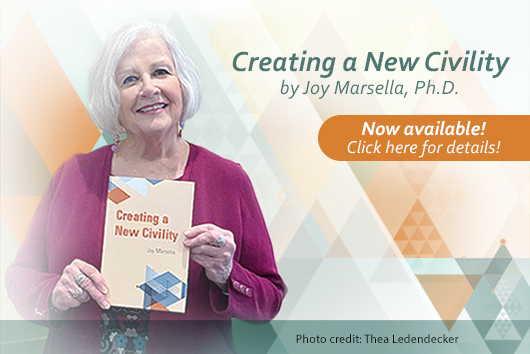
I use the metaphor deliberately. History tells of several cradles of civilization that nestled in fertile places—the crescent of Ancient Egypt and Mesopotamia, and also in Ancient India and Ancient China.
Let us think of nothing less than remaking our America— a home of democracy as spelled out in founding documents, one of the most remarkable forces for freedom known to humankind— into a cradle of civility, a place where civility can renew itself and flourish.
Imagine a strongly woven cloth that cradles your community in civility. Imagine yourself as one of the threads that makes the fabric strong. As such you weave a fabric that respects the community’s constituents, nurture its neighborhoods and various social and civic groups, all in the name of a strengthened democracy.
In this website, I suggest ways you can strengthen the cloth and reconstitute its flawed spots at the same time you build community by committing to full humanity, interdependence of us all, and common good.
As you can see, the new civility folds manners and courtesy into a new civility that focuses on concern and commitment for those who inhabit your life— of course your family and friends but also those with whom you study, work, and worship.
Embracing this larger sense of civility, your life blossoms and opens to new personal, public, and perhaps political possibilities.
In your own way, you contribute to civic renewal.
Civility Dynamics™ is devoted to helping you embrace a renewed, deeper sense of civility. It is understood that disagreements, advocating for one’s point of view, and compromise are still part of the debate that occurs in achieving a common cause. Civility Dynamics™ does not offer advice, teach manners and courtesy, engage in mediation or conflict resolution. Nor does it teach rules for civil behavior. All these approaches are well covered by programs and publications.
It does offer personal and professional development in the skills that maintain an abiding civility: learning new ways to listen; valuing quiet, silence, and reflection; understanding the many aspects of one’s identity and how their proclivities lead to (un)civil behavior; considering how point of view, location, constraints, reciprocity, and timing construct a (un)civil relationship; exploring caring connections that lead to civil behavior, including the role of the one caring, and the one cared for; examining the range of relationships that have the potential for compromise, perhaps even peace.
